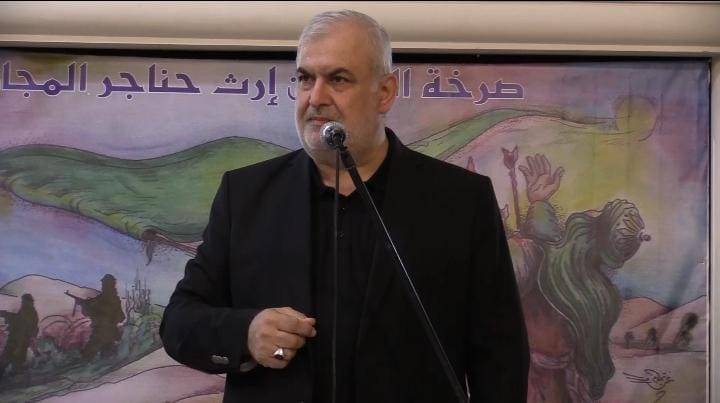
The leader of the Hezbollah parliamentary group, Mohammad Raad, during a ceremony in Nabatieh, in southern Lebanon, on Aug. 27, 2022. (Credit: Mountasser Abdallah)
The head of Hezbollah’s parliamentary group, Mohammad Raad, said Saturday that the “presidential battle” in Lebanon would be between electing a head of state “who truly respects national sovereignty” and “signing agreements with those who want to harm that sovereignty.”
“Today, we face two problems: the first is that we have enemies who want to undermine or harm sovereignty. We are concerned with preserving this sovereignty, which is part of our national, human and moral dignity and helps us protect our resources,” Raad said during a ceremony in Nabatieh, South Lebanon. He added that only by exploiting these resources, including oil and gas, would it be possible to “solve the economic crisis and fill the financial deficit” of Lebanon, which has been in full economic collapse for three years.
Hezbollah has regularly returned in recent weeks to the possibility of resolving the economic crisis through energy resources, against the backdrop of the dispute with Israel over the countries’ maritime border, which has so far delayed offshore exploration.
‘Political abuses’
“We are also facing the problem of political abuses by many parties, whose stakes are simply not the same as ours,” added Raad. “The head of state is the person who signs agreements and is in charge of negotiations with others,” he pointed out, stressing from this perspective that the future president could either be “a strong president who really respects national sovereignty, defends it and sacrifices for it, or a president programmed to sign agreements with those who want to harm that sovereignty.”
“That is where the horizon of the presidential battle lies, not in the nomination of one such person or another,” he added. “Before we think about nominating candidates, we must think about what we want to protect with our choices for president,” he said.
Negotiations are currently being conducted by the US envoy Amos Hochstein between Lebanon and Israel to resolve the border dispute between the two countries. The mediator is expected to return to Lebanon at the end of August or beginning of September to continue his talks.
His anticipated arrival would align with the beginning of presidential election period to chose a successor to President Michel Aoun, which will run from Aug. 31 to Oct. 31. Hezbollah is an ally of two of the political leaders who could lead the presidential battle, or at least have a say in the candidacies: the leader of the Free Patriotic Movement, Gebran Bassil, and his rival, the leader of Marada, Sleiman Frangieh.
Opposite them, the leader of the Lebanese Forces, Samir Geagea, who considers himself a natural candidate for the office, is the sworn enemy of Hezbollah and has based his discourse on opposition to the party.